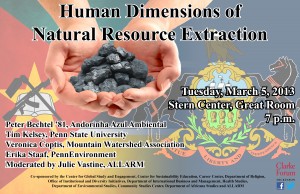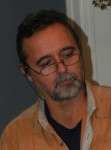Tuesday, March 5, 2013
Stern Center, Great Room, 7:00 p.m.
 Panelists:
Panelists:
Peter Bechtel ’81 – Andorinha Azul Ambiental
Tim Kelsey, Penn State University
Veronica Coptis, Center for Coalfield Justice
Erika Staaf, PennEnvironment
Moderated by Julie Vastine, ALLARM
Natural resource extraction has been at the heart of economic growth and, for that reason, remains a source of considerable political and economic controversy. Both Pennsylvania and Mozambique are currently experiencing a boom in natural gas exploration while they yet confront the economic, social, and environmental consequences of previous forms of resource extraction. The panel will discuss and compare the two locations, identify commonalities, and see what lessons have been learned.
This event is part of the faculty seminar series titled, Living in a World of Limits and is sponsored by The Clarke Forum for Contemporary Issues and co-sponsored by the Center for Global Study and Engagement, Center for Sustainability Education, Career Center, Department of Religion, Office of Institutional and Diversity Initiatives, Department of International Business and Management, Health Studies, Department of Environmental Studies, Community Studies Center, Department of Africana Studies and ALLARM.
Peter Bechtel, an ’81 Dickinson graduate, worked with the World Wildlife Fund in Mozambique on environmental resource management and wildlife conservation strategies that integrate livelihoods of local peoples. He is now consulting on how Mozambique can develop its natural gas reserves in responsible and sustainable ways.
Tim Kelsey conducts research on issues such as economic and community implication s of Marcellus Shale, public finance and taxation, and land use change. He teaches courses on community-based research methodologies, economic development tools, and community development. He has extensive experience across Pennsylvania presenting informal workshops for local government officials, the business community, and others on these issues. He has been at Penn State since 1991.
s of Marcellus Shale, public finance and taxation, and land use change. He teaches courses on community-based research methodologies, economic development tools, and community development. He has extensive experience across Pennsylvania presenting informal workshops for local government officials, the business community, and others on these issues. He has been at Penn State since 1991.
Veronica Coptis is a lifelong resident of coalfields in Greene County. Veronica has spent many years organizing against coal extraction. She is a community organizer for the Center of Coalfield Justice, a non-profit organization dedicated to protecting the environment and communities from the impacts of fossil fuel extraction. For the past two years, Veronica Coptis was a community organizer with Mountain Watershed Association, Home of the Youghiogheny Riverkeeper, a non-profit grassroots organization dedicated to protecting, preserving and restoring the Youghiogheny River Watershed and surrounding areas. At Mountain Watershed Association she implemented the Marcellus Citizen Stewardship Project, which works to educate, engage, and empower communities to protect themselves from shale gas impacts through monitoring and organizing.
 Erika Staaf is the clean water advocate for PennEnvironment, and works to promote policies that protect and preserve Pennsylvania’s waterways. Most recently, her work has involved defending Pennsylvania’s environment and public health from the threat of gas drilling activities and other extractive industries, and involves a combination of research, citizen organizing and training, media work, coalition-building and direct advocacy.
Erika Staaf is the clean water advocate for PennEnvironment, and works to promote policies that protect and preserve Pennsylvania’s waterways. Most recently, her work has involved defending Pennsylvania’s environment and public health from the threat of gas drilling activities and other extractive industries, and involves a combination of research, citizen organizing and training, media work, coalition-building and direct advocacy.
Julie Vastine ’03 is the director of the Alliance for Aquatic Resource Monitoring (ALLARM) at Dickinson College. She is responsible for leadership of the ALLARM program and providing technical assistance to watershed communities. Julie has worked in the environmental field for twelve years, including time in Washington, D.C. with the international and human rights organization, EarthRights International. A native of the Chesapeake Bay, Julie enjoys working with community organizations to build their capacity to monitor streams and to monitor, protect, and restore water quality in Pennsylvania.
Video of the Presentation


One thought on “Human Dimensions of Natural Resource Extraction – Panel Discussion”
Comments are closed.